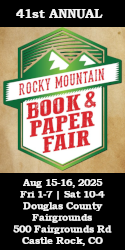Giving Wisely & Books in Buffalo
Gideon Planish, an almost forgotten novel by Sinclair Lewis, is a merciless satire of what turned out to be one of America’s major growth industries. Lewis expanded on a theme that was anticipated by Charles Dickens’ irate essay entitled The Begging-Letter Writer :
The amount of money he annually diverts from wholesome and useful purposes in the United Kingdom, would be a set-off against the Window Tax. He is one of the most shameless frauds and impositions of this time. . . I, the writer of this paper, have been, for some time, a chosen receiver of Begging Letters. For fourteen years, my house has been made as regular a Receiving House for such communications as any one of the great branch Post-Offices is for general correspondence. . . He always belongs to a Corresponding-Society of Begging-Letter Writers. Any one who will, may ascertain this fact. Give money to-day in recognition of a begging-letter, – no matter how unlike a common begging-letter, – and for the next fortnight you will have a rush of such communications. . . The poor never write these letters. Nothing could be more unlike their habits. The writers are public robbers; and we who support them are parties to their depredations. They trade upon every circumstance within their knowledge that affects us, public or private, joyful or sorrowful. . .
Dickens was complaining about individual frauds who turned extracting of money, through the emotionally-charged exploitation of natural feelings of charity and generosity, into a chain of cottage industries.
Writing in the 1940s, Sinclair Lewis creates a character, Gideon Planish, who combines his deficiency in scholarly attainments with a natural gift for high-flown rhetoric to become Professor of Rhetoric and Speech at a small mid-western college. Not long after being promoted to Dean and shortly before being outed (and ousted) as an academic fraud, he discovers his real talent lies in fund-raising on the institutional level.
Gideon joins the Heskett Foundation, a profitable little mid-western begging shop that raises lots of money by basically telling people that rural education is a good thing. Bounced for overplaying his hand, he goes to New York and is hired as the executive director of the Association to Promote Eskimo Culture, Inc., based on the strength of his vague knowledge that Eskimos lived somewhere in the North, lived in snow houses and ate blubber.
His stay with APEC, Inc., of short duration, leads to some work for the Antinomians, or the True New Reformed Tabernacle of the Penitents Saints of the Assembly of God. From then on it’s one “charity” or lobbying group after another until he lands in the big time. One such group, the Citizens’ Conference on Constitutional Crises in the Commonwealth or “Cizkon”, scares money out of people who feel threatened by the rising power of labor unions, another is called the Every Man a Priest Fraternity, and so on.
One of his role models is the Hon. Deacon Ernest Wheyfish, ex-congressman, author of Make Them Pay While They Pray, and head of something called the Blessed to Give Brotherhood. From Deacon Wheyfish Gideon learns that it’s not about the mission, it’s all about the message, the method and the money, and in a rousing speech before a convention of fund-raisers, including the “distinguished Dr. Elmer Gantry”, the Deacon says, among other things:
As many of you know, philanthropy, in hard dollars and cents, already ranks eighth among the major industries of America... but it ought to rank first... What can a man purchase... that will afford him such spiritual benefit... as the knowledge that he is permitting the better organization executives the means and the leisure to go around doing good...
The raising of funds must be a separate calling... And yet some of you, my friends, tend to forget this... and go around daydreaming about what good you’d do if you only had the cash... instead of first raising the cash and then seeing if there’s some good you can do with it.
As war clouds gather in Europe, charity and religion take second seat to raising money for the purpose of telling people how and what they should think in matters of war, peace or public policy in general. A new group is formed, the self-appointed Dynamos of Democratic Direction (DDD), to provide this guidance and leadership, and even though the members themselves can’t decide whether Hitler and Mussolini are devils incarnate, potential drinking-buddies, or something in between, no matter which way the wind blows they stand ready to lead the masses and will need plenty of money to do it. In a memo to the head of the DDD, Gideon writes:
All ordinary citizens, especially those west of Buffalo, need instruction and direction in becoming thoroughly democratic from trained thinkers like ourselves. When we have given our democracy to the entire nation, then America will enforce it on the rest of the world...
While the world situation is becoming more complicated and morally fraught, Gideon visits his old college in the mid-west, feels the urge to nourish his academic roots that were never strong to begin with, is offered the job of president of the college where he was once dean, and returns to New York to run the idea by his wife. What happens? You’ll have to read the novel to find out.
The contents of our own mail box (both snail and electronic) confirm my suspicion that Charles Dickens and Sinclair Lewis were ahead of their time in pointing out there’s a lot of money to be made through the exploitation of guilt and fear. More than that, it really has become one of our major growth industries
Note: our own giving goes to support local charitable and public organizations – any begging letters, often with a New York or Washington (especially K or L Street) return address, are almost never opened.
*
We’ve known booksellers Ron and Marilee Cozzi for about 25 years and though Buffalo is just a few hours west of Cazenovia, we visited their book store for the first time this past summer while on our way to Ohio. To paraphrase an old cliché, Old Editions is an antiquarian bookstore and Secretariat ran around a dirt track.
Old Editions occupies a four-story brick building (five, counting the basement), at the corner of East Huron and Oak, that was formerly a St. Vincent de Paul charity store. With a relatively new freight elevator, the five levels are designed and laid out for what Ron calls essentially a warehouse operation. With an on-premises cafe and well designed and attractively furnished public areas on two floors, what visitors see is an antiquarian book operation larger than most, with more than enough in the way of books to keep serious browsers busy for hours if not days. There is also an art department with walls hung with original art, framed maps and prints. Access to the rare book department and the old-fashioned wood and glass paneled office area is limited, and visitors must wait to be buzzed in. But the part that almost no one sees are the vast storage areas on the main and top two floors, an inside loading dock, and endless boxes (all carefully labeled) of books and ephemera, sorted by subject and arranged on what I would estimate as many thousands of feet of wood and steel shelving. The iceberg metaphor clearly applies.
The realities of operating a traditional, publicly-accessible bookstore being what they are these days, Ron and Marilee also rely on book fairs and internet sales to subsidize what is surely one of Buffalo’s present-day cultural landmarks. Also, hard work, good organization and ebullient personalities, must all contribute to their ability to survive in the current economic climate. And as self-serving as it seems (and is), it is only accurate to say that bibliophiles from various parts of the country who make annual buying trips to the bookstore have told Ron that they first learned about Old Editions through this magazine.
The business appears to be thriving, and though Ron gives no indication he’s anywhere close to retirement, he did mention that the structural engineers who planned the remodeling of the building told him the hundreds of 40-foot, 3 inch x 12 inch solid oak support beams have a current value of at least $1000.00 each. Architectural salvage is one of the hotter areas of the economy at the moment.
*
This weekend Ali, our old friend from Youngstown, Ohio will be arriving and we’ll probably do what we usually do when visiting each other – help with gardening projects, share ideas, make short road trips, and just hang out. We were in graduate school in Syracuse during the 60s, our kids grew up together while he was managing college and university bookstores, and we both spend every available minute of spare time in the garden.
One of our projects will be to see if a new variety of fig tree, Chicago Hardy, will actually survive in central New York and north-eastern Ohio. Even though the literature claims it will withstand temperatures down to minus 20° Fahrenheit and fig trees are common where Ali grew up in Yemen (winters can be cold at night), we’re both anxious to see if the experiment pans out. The one Raquel and I planted a few weeks ago had already set fruit and Ali’s, still in a container at the moment, will be safely established in his garden by the time you read this. I’ll let you know what happens next spring.
We dodged a light frost in mid-September but now that the weather has warmed a bit, we might eke out a few more weeks of growing weather before really being hit. Last year our dahlias, Japanese anemone, marigolds, cosmos, canna lilies, elephant ears and other cold-sensitive plants were going full tilt right up until the end of October and our departure for Italy. We should be so lucky this year.
*
Paul Minet’s “Letter from England” column, a regular feature of Book Source Magazine for many years, will no longer appear. In a conversation earlier today Paul asked me to tell our readers that he is “unable to continue and is gradually fading out”. Sheila did say that the notes, cards and letters he’s received have helped to cheer him up, so anyone of a mind to may send a note to Paul at 3 Apsley Court, Pickforde Lane, Ticehurst, East Sussex, TN5 7BJ, England.


























